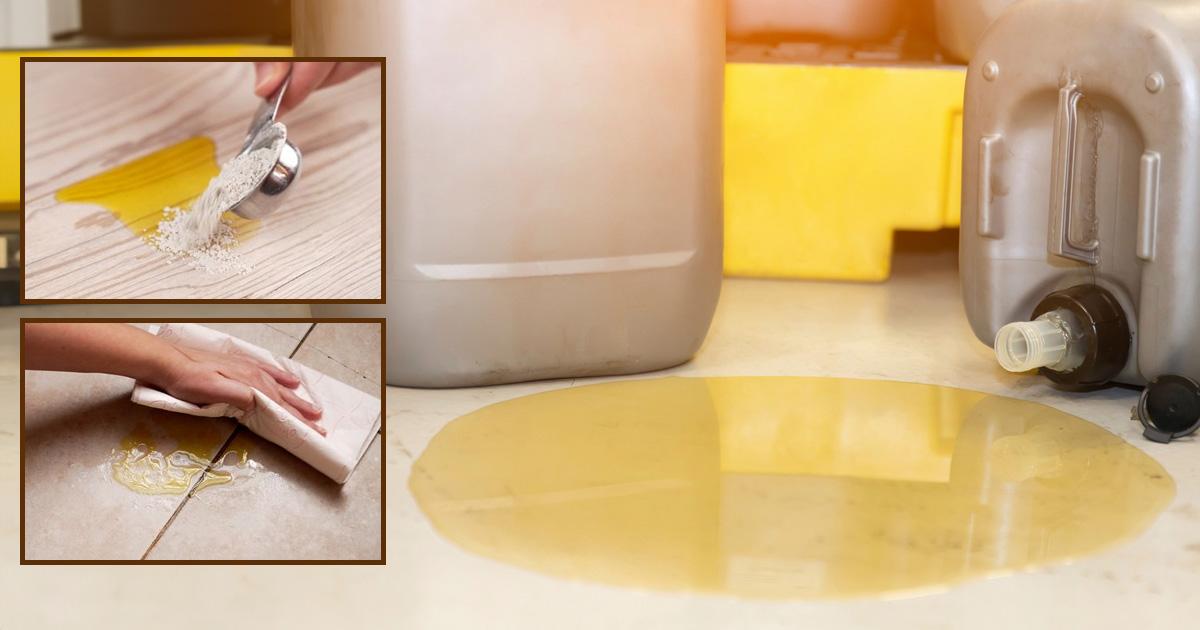From Mess to Fresh: How to Clean Spilled Oil and Save the Day

Spilled oil can be a nightmare, especially in your kitchen. Knowing the proper cleanup techniques can save you a lot of time and effort, whether it’s cooking oil, olive oil, or vegetable oil. Learn the best methods to clean spilled oil effectively, ensuring your surfaces are spotless and safe.
Spilled Oil? Act Fast With These Steps
Oil spills can occur when frying, sautéing, or accidentally knocking over a cooking oil container. It can cause dangers like slippery floors, fire risks, and harm to the environment. It’s crucial to clean them up quickly and properly to reduce these risks. Using the wrong cleanup methods can make things worse by spreading the oil and making the area even more dangerous.
These spills can be messy and challenging to clean up, but with the right approach, you can minimize the impact and prevent further damage. Here are some immediate steps you need to take:
The first step in dealing with an oil spill is to act quickly. The longer the oil sits, the more difficult it will be to clean. Prompt action can prevent the oil from spreading and seeping into surfaces.
Before you start cleaning, ensure you’re wearing appropriate protective gear. This might involve gloves to protect your hands and non-slip shoes to prevent mishaps.
Materials You Need to Clean Spilled Cooking Oil
Before cleaning the spilled oil, ensure you have the right supplies and take safety precautions. Here’s what you’ll need:
- Absorbent Materials: Use paper towels, rags, kitty litter, or special oil-absorbing materials.
- Cleaning Agents: Dish soap, degreasers, or special oil-cleaning products will help break down and remove the oil.
- Protective Gear: Wear gloves, goggles, and suitable clothing to protect yourself while cleaning.
- Disposal Containers: Have a container or bag ready to throw away the used absorbent materials and any contaminated items.
How to clean spilled oil?
Cleaning up a cooking oil spill can be relatively straightforward, as the oil is typically less viscous and more accessible to absorb than motor oil or fuel oil. Here’s how to approach this type of spill:
Step 1: Absorb the Excess Oil
Start by absorbing as much of the spilled oil as possible. Use paper towels, absorbent cloths, or old newspapers to blot the oil. Do not rub, as this may disperse the oil even further.
Due to their viscosity, cooking oil spills can be particularly tricky. Blot carefully to remove as much oil as possible before proceeding to the following procedure. Knowing how to clean cooking oil quickly can prevent further mess.
Step 2: Sprinkle a Powder Absorbent
After blotting up the excess oil, generously sprinkle baking soda or cornstarch over the spill. These ingredients will help absorb any residual oil.
Olive oil can be more stubborn due to its thicker consistency. Let the baking soda or cornstarch sit for at least 10-15 minutes to ensure it absorbs as much oil as possible. Understanding how to efficiently clean up olive oil spills will make the task less daunting.
Step 3: Sweep Up the Powder
Once the powder has had time to absorb the oil, sweep it up with a broom and dustpan. To prevent any further mess, dispose of the powder in a trash bag.
Step 4: Wash the Area
Prepare a solution of warm water and dish soap. Dish soap is incredibly excellent at breaking down oils. Using a scrub brush or sponge, thoroughly clean the afflicted area.
Vegetable oil spills may require a bit more elbow grease. Be prepared to scrub more vigorously to remove all residues. Learning to clean up vegetable oil effectively can help maintain a clean kitchen.
Step 5: Rinse and Dry
Wash the area with clean water to remove any soap residue. Dry the surface with a clean towel or let it air dry. Ensure the area is arid to prevent slipping hazards.
How to clean oil spills on different surfaces?
Oil spills can occur on various surfaces, each requiring a different approach for effective cleanup. Here’s a guide on how to clean oil spills on other surfaces, including kitchen countertops, floors, carpets, rugs, and clothing.
- Kitchen Countertops: For spills on kitchen countertops, follow the general steps above. Take careful attention to any seams or cracks where oil may sneak in.
- Floors: Oil spills on floors can be dangerous. After absorbing the excess oil and applying baking soda, mop the floor with warm, soapy water. To increase cleaning power for tile or vinyl floors, add a small amount of white vinegar to the mop water.
- Carpets and Rugs: Oil spills on carpets and rugs require prompt treatment. Blot away any excess oil, and generously add baking soda or cornstarch. Allow it to sit, then vacuum up the powder. You may need to repeat this step. For tough stains, use a carpet cleaner or call a professional.
- Clothing: Blot the excess oil and sprinkle baking soda on the stain for oil spills on clothing. Allow it to sit for a few minutes before brushing it off. Pre-treat the stain with dish soap before washing the clothing, usually.
How can cooking oil spills be prevented in the future?
To minimize the risk of future cooking oil spills, consider the following preventive measures:
- Use Oil Dispensers: Oil dispensers with a controlled pour spout can help minimize the risk of spills.
- Cook with Care: Be mindful when cooking, especially with large amounts of oil. Keep pans and bottles away from the counter’s edge to avoid spills.
- Keep Cleaning Supplies Handy: Having cleaning supplies readily available in the kitchen can help you address spills quickly and efficiently.
- Regular Maintenance: Regularly inspect cooking equipment and containers for signs of leaks or potential spill sources and address any issues promptly.
- Proper Disposal: Dispose of used oil and contaminated materials following local regulations to prevent environmental contamination.
Clean the Spilled Oil Fast & Easy!
Cleaning up spilled oil can be challenging, but it’s much more manageable with the correct methods. Whether you spill cooking, olive, or vegetable oil, acting quickly and using suitable materials helps. Following the steps above, you can effectively clean oil spills from different surfaces and keep your kitchen clean and safe. Also, taking simple precautions can help prevent future spills, making cooking more enjoyable and less stressful.

